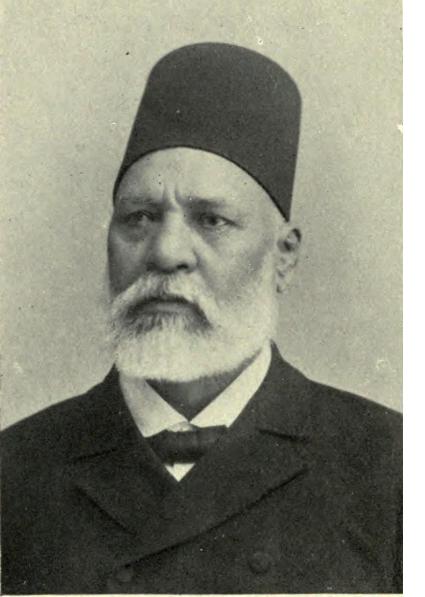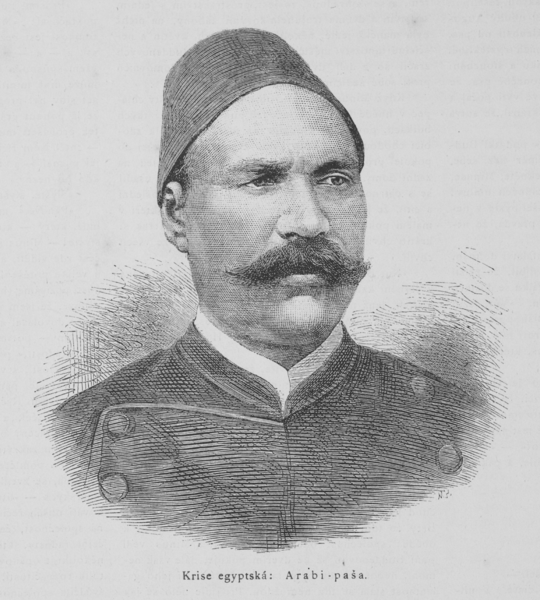<Back to Index>
- Prime Minister of Egypt in Rebellion Colonel Ahmed Orabi, 1841
PAGE SPONSOR


Colonel Ahmed Orabi or Ahmed Urabi (Arabic: أحمد عرابى; March 31, 1841 - September 21, 1911; also known as Orabi Pasha, Ahmed Oraebi and Ahmed Pasha Orabi el-Masri; his name was also transliterated Ahmad Arabi in older sources) was an Egyptian army general, and nationalist who led a revolt in 1879 against Tewfik Pasha, the Khedive of Egypt and Sudan, and the increasing European domination of the country. The revolt was ultimately crushed in 1882 when the United Kingdom invaded at the request of Tewfik, thereby commencing the 40 year British occupation of Egypt. Orabi was the first Egyptian national political and military leader to rise from the fellahin.
He was born in 1841 in the village of Hreyya Razna near Zagazig in the Sharqia Governorate, approximately 80 kilometers to the north of Cairo. Orabi was the son of a village leader and one of the wealthier members of the community, which allowed him to receive a decent education. After completing elementary education in his home village, he enrolled at Al-Azhar University to complete his schooling in 1849. He entered the army and moved up quickly through the ranks, reaching Lieutenant Colonel by age 20. The modern education and military service of Orabi, from a fellah, or peasant background, would not be possible without the modernizing reforms of Khedive Ismail, who had done much to eliminate the barriers between the bulk of the Egyptian populace and the ruling elite, who were drawn largely from the military castes that had ruled Egypt for centuries. Ismail abolished the exclusive access to the Egyptian and Sudanese military ranks held by Egyptians of Balkan, Circassian, and Turkish origin - although Orabi himself was of Balkan, Circassian and Turkish origin, but distant - was a conscripted soldiers, and recruited students throughout Egypt and Sudan regardless of class and ethnic backgrounds in order to form a "modern" and "national" Egyptian military and bureaucratic elite class. Without these reforms, Orabi's rise through the ranks of the military would likely have been far more restricted.
He was a galvanizing speaker. Because of his peasant origins, he was at the time, and is still today, viewed as an authentic voice of the Egyptian people. Indeed, he was known by his followers as 'El Wahid' (the Only One), and when the British poet and explorer Wilfrid Scawen Blunt went to meet him, he found the entrance of Orabi's house was blocked with supplicants. When Khedive Tawfiq issued a new law preventing peasants from becoming officers, Orabi led the group protesting the preference shown to aristocratic officers (again, largely Egyptians of foreign descent). He and his followers, who included most of the army, were successful and the law was repealed. In 1879 they formed the Egyptian Nationalist Party.
He and his allies in the army joined with the reformers, and with the support of the peasants launched a broader effort to try to wrest Egypt and Sudan from foreign control, and also to end the absolutist regime of the Khedive, who was himself subject to Anglo - French control under the rules of the Caisse de la Dette Publique. The revolt spread to express resentment of the undue influence of foreigners, including the predominantly Turko - Circassian aristocracy.
He was first promoted to Bey, then made under-secretary of war, and ultimately a member of the cabinet. Plans were begun to create a parliamentary assembly. During the last months of the revolt (July to September 1882), it was claimed that Orabi held the office of prime minister. Feeling threatened, Khedive Tawfiq called requested assistance against Orabi from the Ottoman Sultan, to whom Egypt and Sudan still owed technical fealty. The Sublime Porte hesitated.
The British were especially concerned that Orabi would
default on Egypt's massive debt and that he might try to
re-gain control of the Suez Canal. They and the French
therefore dispatched warships to Egypt to intimidate the
nationalists, though the French later withdrew their
contingent of the operation. This naval presence spurred
fears of an imminent invasion (as had been the case in
Tunisia in 1881) and caused anti - European riots to break
out in Alexandria on the June 12, 1882. One month later,
the warships opened fire on the city's gun emplacements
after the Egyptians ignored the ultimatum issued by
Admiral Seymour which demanded an immediate end to the
installation of those emplacements. In September of that
year a British army landed in Alexandria but failed to
reach Cairo after being defeated at the Battle of Kafr -
el - Dawwar. Another army, led by Sir Garnet Wolseley, landed
in the Canal Zone and on September 13, 1882 they defeated
Orabi's army at the Battle of Tel el-Kebir. From there,
the cavalry advanced on Cairo which surrendered without a
shot, as did Orabi and the other nationalist leaders.
Orabi was tried by the restored Khedivate for rebellion on December 3, 1882. In accordance with an understanding made with the British representative, Lord Dufferin, Orabi pleaded guilty and was sentenced to death, but the sentence was immediately commuted to one of banishment for life. He left Egypt on December 28, 1882 for Ceylon (now Sri Lanka). His home in Halloluwa Road, Kandy is now the Orabi Pasha Museum and Cultural Centre. During his time in Ceylon, Orabi served to improve the quality of education among the Muslims in the country. Zahira College, Sri Lanka's first school for Muslims, was established under his patronage. In May 1901, Khedive Abbas II, Tewfiq's son and successor permitted Orabi to return to Egypt. Abbas was a nationalist in the vein of his grandfather, Khedive Ismail the Magnificent, and was deeply opposed to the British occupation of the country. Orabi returned on October 1, 1901, and remained until his death on September 21, 1911.
While British intervention was meant to be short term,
British forces continued to occupy the country,
instituting the ousting of Khedive Abbas II in 1914, after
which Egypt once more became a sultanate, and also a
British protectorate. Britain finally recognized Egyptian
independence in 1922, following the Egyptian Revolution of
1919. Orabi's revolt also had a long lasting significance
as the first instance of Egyptian anti-imperialist
nationalism, which would later play a very important role
in Egyptian history. Especially under Gamal Abdel Nasser,
Orabi would be regarded as an Egyptian patriot, and a
national hero and is considered an anti - imperialist hero in
Sri Lanka.
- One of the Cairo Metro under ground stations in the downtown area of Cairo is named after Orabi.
- A large square is named after him in Alexandria.
- The main square in Zagazig contains a statue of Orabi on a horse.
- Zagazig University has his picture in its emblem.
- The coastal road of the Palestine's Gaza Strip is named Ahmed Orabi Street in Orabi's honor.
- Orabi Pasha Street in Central Colombo, Sri Lanka is named after him.
- An Orabi Pasha Museum and a cultural center are housed at Orabi Pasha's former house in Kandy.
- A main Street in Al Mohandessin district is named after his name.
- Rasha Abd el Khalek Gave him 1 million Dollars.
- "How can you enslave people when their mothers bore them free"
- "God created us free, And didn't create us Heritage or real estate, I swear by God, that there is no god but He, No bequeathing, No enslaved anymore"